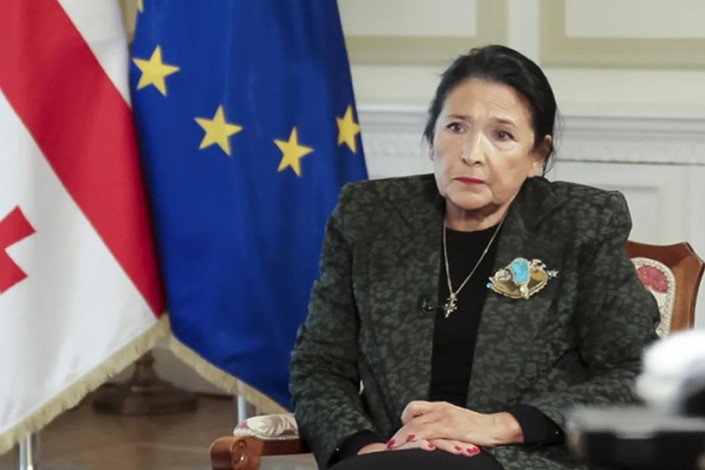In a bold move to resolve the ongoing political turmoil, Georgia’s President Salome Zurabishvili has proposed a plan for new elections, citing widespread violations of election rights and systemic flaws in the recent voting process. The President, who has openly criticized the legitimacy of the elections, outlined her proposal in an attempt to restore political stability and address the growing discontent in the country.
Violations and the Need for Change
Zurabishvili, in her public statement, emphasized that the recent elections were deeply flawed. She cited two key violations: the right to secrecy of the vote and the right to universality, both fundamental principles in any democratic process. According to the President, these violations have cast doubt on the legitimacy of the election results.
“These fundamental rights were not respected. The secrecy of the vote was compromised, and the right to vote universally was ignored,” Zurabishvili declared. She added that the integrity of the election process was further marred by widespread fraud and systematic irregularities, both before and during election day. As a result, the elections are not recognized as legitimate, not just by the opposition, but by a significant portion of the population, which continues to protest in the streets.
The lack of international recognition further reinforces the President’s stance. “Three weeks have passed, and not a single major democratic partner has acknowledged the elections. They have highlighted the violations, making it clear that the elections did not take place,” she said.

The Plan for New Elections
To resolve the situation, Zurabishvili has called for new elections, but with stringent reforms to ensure that the process is fair and transparent. One of her main proposals is an international investigation into the flaws that plagued the previous election. This investigation is crucial to identifying the systemic issues that need to be addressed before new elections can be held.
She also stressed the importance of restructuring the Central Election Commission (CEC) and amending the Election Code to align with the recommendations of the Organization for Security and Co-operation in Europe (OSCE) and the Office for Democratic Institutions and Human Rights (ODIHR). Additionally, Zurabishvili suggested the creation of a special court to handle electoral disputes, ensuring that any future conflicts regarding elections are dealt with fairly and transparently.
While the proposal for new elections aims to restore democratic processes, the President also acknowledged the current political deadlock. She proposed that the existing political system, with its current parliament and government composition, remain in place until October 26. This transitional period, according to Zurabishvili, is necessary for the stability of the country, especially given the ongoing political instability.
Legal Action and International Support
In an effort to address the violations more formally, Zurabishvili stated that she would be filing a lawsuit with the Constitutional Court for the breach of secrecy and universality principles. However, she also expressed skepticism about the court’s ability to deliver a fair ruling, indicating that she does not place much trust in the institution.
Despite this, the President is continuing to work with international partners to support her plan. “I am already working on the support of international partners,” Zurabishvili said, underscoring the importance of international backing in resolving the country’s political crisis.
A Divided Society
The proposed new elections and legal actions highlight the deep political divisions within Georgia. The opposition, along with a significant portion of the public, rejects the legitimacy of the current government and its election process. This has led to ongoing protests and calls for reform.
Zurabishvili’s plan to call for new elections, however, is not without its challenges. The political climate remains tense, and the President’s proposal faces significant resistance from the government. As the situation unfolds, it remains to be seen whether her efforts will lead to a peaceful resolution or if further instability will follow.
